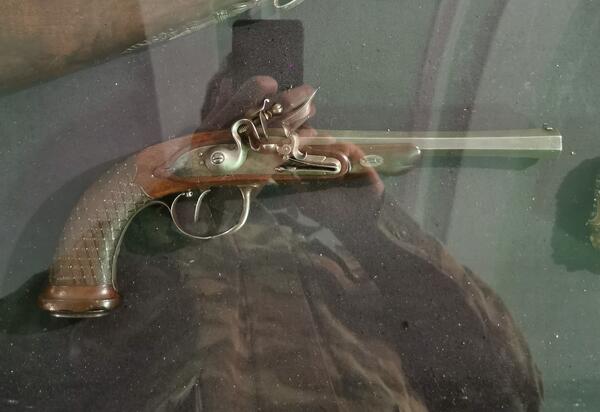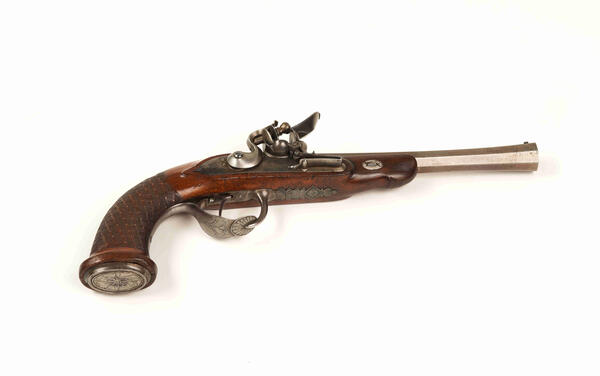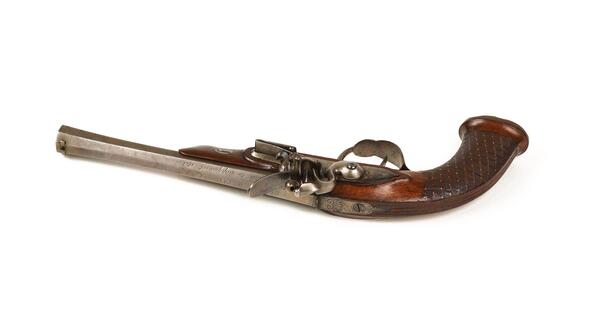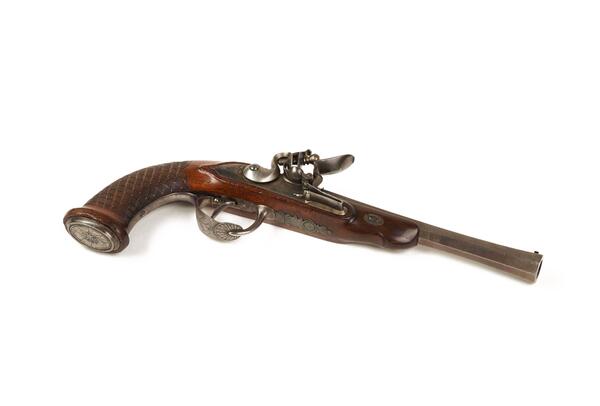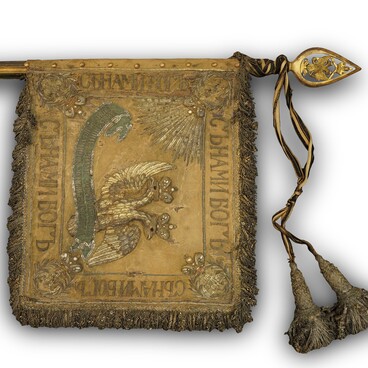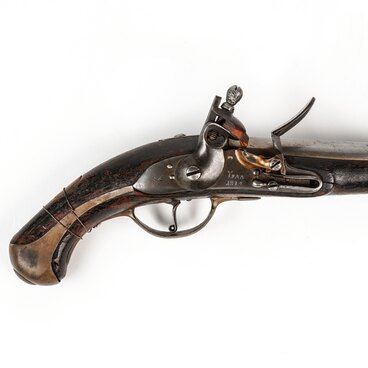This flintlock pistol was manufactured at the Boutet arms factory in Versailles. The weapon belonged to Marshal Joachim Murat. Born in the village of Labastide-Fortunière near Toulouse, he enjoyed the patronage of the House of Talleyrand and received a good education. He was promised an ecclesiastical position, but he himself preferred to enlist in a chasseur cavalry regiment as a private. For unwillingness to follow the chain of command, he was dismissed.
Murat returned to the Constitutional Guard of Louis XVI, proved himself a desperate duelist, and by 1793 became a captain; a year later he was removed from command. In Paris, he met Napoleon and earned his trust by suppressing royalist uprisings. For the courage he demonstrated in the Italian campaign, he was appointed a brigadier general. His subordinates were dazzled by his almost reckless bravery and willingness to save his comrades by putting himself in jeopardy. Murat returned from the Egyptian expedition as a divisional general.
By 1805 Murat was already Governor-General of Paris, Marshal, Admiral-General, senator, Prince of the Imperial House and a recipient of the Cross of the Legion of Honor.
The Marshal distinguished himself in many campaigns, including the Battles of Austerlitz and Preussisch-Eylau.
In 1808, Murat received from Napoleon the Crown of Two Sicilies and created a powerful Sicilian army of 40,000 soldiers. His position of Napoleon’s vassal began to weigh on him, and disagreements arose in their relationship. However, when planning his Russian invasion, Napoleon again called on his favorite.
In 1812, Murat took charge of the reserve cavalry, and marched in the vanguard, using every opportunity to attack. The battles near Smolensk and at Valutino were unsuccessful for the Marshal. Near Borodino, the cavalry was inspired by his courage. He survived unlike many others and then pursued the retreating Russian army until he lost it thanks to Kutuzov’s artful military maneuver.
At Tarutino on October 6, 1812, the Russian troops under the command of Mikhail Illarionovich Kutuzov caught Murat’s units by surprise. The French suffered serious losses, but were not totally defeated. Murat managed to stop the panic and repel the attackers, while Kutuzov himself did not want to engage in a major battle and did not want to unnecessarily risk the lives of his soldiers.
The Battle of Tarutino was the last engagement when Murat managed to prove himself. To commemorate this battle, the Russian soldiers kept the presented trophy pistol.
Murat returned to the Constitutional Guard of Louis XVI, proved himself a desperate duelist, and by 1793 became a captain; a year later he was removed from command. In Paris, he met Napoleon and earned his trust by suppressing royalist uprisings. For the courage he demonstrated in the Italian campaign, he was appointed a brigadier general. His subordinates were dazzled by his almost reckless bravery and willingness to save his comrades by putting himself in jeopardy. Murat returned from the Egyptian expedition as a divisional general.
By 1805 Murat was already Governor-General of Paris, Marshal, Admiral-General, senator, Prince of the Imperial House and a recipient of the Cross of the Legion of Honor.
The Marshal distinguished himself in many campaigns, including the Battles of Austerlitz and Preussisch-Eylau.
In 1808, Murat received from Napoleon the Crown of Two Sicilies and created a powerful Sicilian army of 40,000 soldiers. His position of Napoleon’s vassal began to weigh on him, and disagreements arose in their relationship. However, when planning his Russian invasion, Napoleon again called on his favorite.
In 1812, Murat took charge of the reserve cavalry, and marched in the vanguard, using every opportunity to attack. The battles near Smolensk and at Valutino were unsuccessful for the Marshal. Near Borodino, the cavalry was inspired by his courage. He survived unlike many others and then pursued the retreating Russian army until he lost it thanks to Kutuzov’s artful military maneuver.
At Tarutino on October 6, 1812, the Russian troops under the command of Mikhail Illarionovich Kutuzov caught Murat’s units by surprise. The French suffered serious losses, but were not totally defeated. Murat managed to stop the panic and repel the attackers, while Kutuzov himself did not want to engage in a major battle and did not want to unnecessarily risk the lives of his soldiers.
The Battle of Tarutino was the last engagement when Murat managed to prove himself. To commemorate this battle, the Russian soldiers kept the presented trophy pistol.

